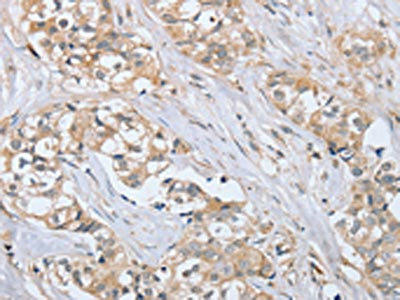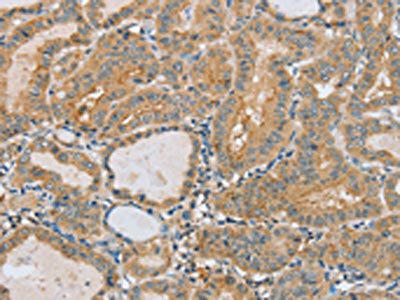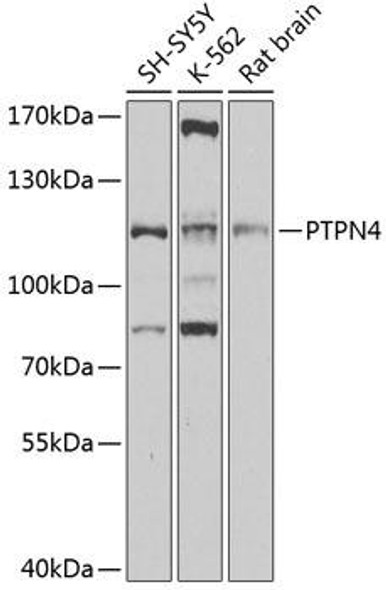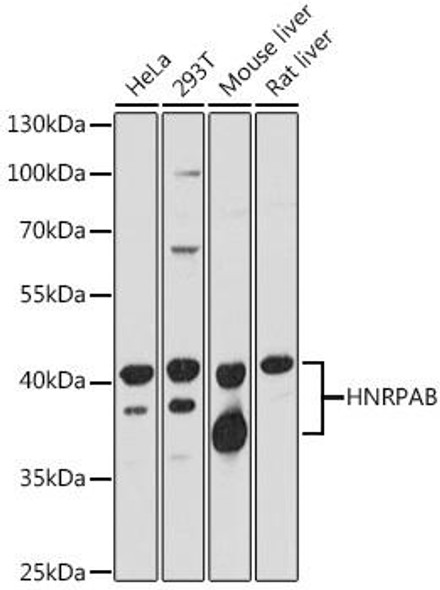Description
PTPN4 Antibody (PACO20294)
The PTPN4 Polyclonal Antibody (PAC02094) is a valuable tool for researchers studying PTPN4, a protein tyrosine phosphatase involved in various cellular processes, such as cell growth, differentiation, and immune response regulation. This antibody, produced in rabbits, is highly specific for human samples and is validated for use in Western blot applications.PTPN4, also known as protein tyrosine phosphatase non-receptor type 4, plays a crucial role in signaling pathways that control cell growth and differentiation. Dysregulation of PTPN4 has been linked to diseases like cancer, autoimmune disorders, and neurological conditions.
Therefore, studying the expression and activity of PTPN4 using this antibody can provide valuable insights into disease mechanisms and potential therapeutic targets.With its high reactivity and specificity, the PTPN4 Polyclonal Antibody is a reliable tool for researchers conducting studies in the fields of cell biology, immunology, and cancer research. Its ability to detect PTPN4 in various cell types makes it an ideal choice for investigating the molecular mechanisms underlying disease pathogenesis and developing targeted therapies.
| Antibody Name: | PTPN4 Antibody (PACO20294) |
| Antibody SKU: | PACO20294 |
| Size: | 50ul |
| Host Species: | Rabbit |
| Tested Applications: | ELISA, IHC |
| Recommended Dilutions: | ELISA:1:2000-1:5000, IHC:1:50-1:200 |
| Species Reactivity: | Human, Mouse |
| Immunogen: | Synthetic peptide of human PTPN4 |
| Form: | Liquid |
| Storage Buffer: | -20°C, pH7.4 PBS, 0.05% NaN3, 40% Glycerol |
| Purification Method: | Antigen affinity purification |
| Clonality: | Polyclonal |
| Isotype: | IgG |
| Conjugate: | Non-conjugated |
 | The image on the left is immunohistochemistry of paraffin-embedded Human breast cancer tissue using PACO20294(PTPN4 Antibody) at dilution 1/40, on the right is treated with synthetic peptide. (Original magnification: x200). |
 | The image on the left is immunohistochemistry of paraffin-embedded Human thyroid cancer tissue using PACO20294(PTPN4 Antibody) at dilution 1/40, on the right is treated with synthetic peptide. (Original magnification: x200). |
| Background: | The protein encoded by this gene is a member of the protein tyrosine phosphatase (PTP) family. PTPs are known to be signaling molecules that regulate a variety of cellular processes including cell growth, differentiation, mitotic cycle, and oncogenic transformation. This protein contains a C-terminal PTP domain and an N-terminal domain homologous to the band 4.1 superfamily of cytoskeletal-associated proteins. |
| Synonyms: | protein tyrosine phosphatase, non-receptor type 4 (megakaryocyte) |
| UniProt Protein Function: | PTPN4: May act at junctions between the membrane and the cytoskeleton. Belongs to the protein-tyrosine phosphatase family. Non-receptor class subfamily. |
| UniProt Protein Details: | Protein type:Protein phosphatase, tyrosine (non-receptor); Motility/polarity/chemotaxis; EC 3.1.3.48 Chromosomal Location of Human Ortholog: 2q14.2 Cellular Component: internal side of plasma membrane; cytoskeleton; cytoplasm Molecular Function:protein binding; cytoskeletal protein binding; non-membrane spanning protein tyrosine phosphatase activity Biological Process: protein amino acid dephosphorylation |
| NCBI Summary: | The protein encoded by this gene is a member of the protein tyrosine phosphatase (PTP) family. PTPs are known to be signaling molecules that regulate a variety of cellular processes including cell growth, differentiation, mitotic cycle, and oncogenic transformation. This protein contains a C-terminal PTP domain and an N-terminal domain homologous to the band 4.1 superfamily of cytoskeletal-associated proteins. This PTP has been shown to interact with glutamate receptor delta 2 and epsilon subunits, and is thought to play a role in signalling downstream of the glutamate receptors through tyrosine dephosphorylation. [provided by RefSeq, Jul 2008] |
| UniProt Code: | P29074 |
| NCBI GenInfo Identifier: | 131531 |
| NCBI Gene ID: | 5775 |
| NCBI Accession: | P29074.1 |
| UniProt Secondary Accession: | P29074,Q9UDA7, B2RBV8, |
| UniProt Related Accession: | P29074 |
| Molecular Weight: | 926 |
| NCBI Full Name: | Tyrosine-protein phosphatase non-receptor type 4 |
| NCBI Synonym Full Names: | protein tyrosine phosphatase, non-receptor type 4 (megakaryocyte) |
| NCBI Official Symbol: | PTPN4 |
| NCBI Official Synonym Symbols: | MEG; PTPMEG; PTPMEG1 |
| NCBI Protein Information: | tyrosine-protein phosphatase non-receptor type 4; PTPase-MEG1; megakaryocyte phosphatase; protein tyrosine phosphatase MEG1; protein-tyrosine phosphatase MEG1; megakaryocyte protein-tyrosine phosphatase |
| UniProt Protein Name: | Tyrosine-protein phosphatase non-receptor type 4 |
| UniProt Synonym Protein Names: | Protein-tyrosine phosphatase MEG1; MEG; PTPase-MEG1 |
| Protein Family: | Tyrosine-protein phosphatase non-receptor |
| UniProt Gene Name: | PTPN4 |
| UniProt Entry Name: | PTN4_HUMAN |











